
6 Vital Nutrients and Why Your Body Must Have Them
Table of Contents
Vital nutrients
Essential nutrients are compounds that the body can’t make or can’t make in sufficient quantity. According to the World Health Organization, these nutrients must come from food, and they are vital for disease prevention, growth, and good health.
While there are many vital nutrients, they can be broken up into two categories: macronutrients and micronutrients. Macronutrients are eaten in large amounts and include the building blocks of your diet by providing the body with energy: protein, carbohydrates, and fat. Vitamins and minerals are micronutrients, and small doses go a long way. There are six main groups of essential micronutrients and macronutrients.
1. Protein
Protein is having its moment, and not just in the workout community. But all of the hype is for a good reason. Protein is essential for good health.
Protein provides the building blocks of the body, and not just for muscle. Every cell, from bone to skin to hair, contains protein. A startling 15 percent of the average person’s body weight is from protein. Protein is used primarily for growth, health, and body maintenance. All of your hormones, antibodies and other important substances are composed of protein. Protein is not used to fuel the body unless necessary.
Proteins are made of up different amino acids. While the body can create some amino acids on its own, there are many essential amino acids that can only come from food. You need a variety of amino acids for the body to function properly. The good news is that you don’t need to eat all of the amino acids at once. Your body can create complete proteins from the foods you eat throughout the day.
Healthy sources
While meat, fish, and eggs are good sources of essential amino acids, you can also get protein from plant sources like beans, soy, nuts, and some grains. Exactly how much protein you need daily depends on a variety of factors including how active you are, and your age.
Despite the growing popularity of high-protein diets, there haven’t been enough studies to prove that they are healthier or can influence weight loss, according to the National Institute of Health and the Mayo Clinic.
2. Carbohydrates
Don’t let the low-carb craze fool you; carbohydrates are necessary for a healthy body. Carbs fuel your body, especially your central nervous system, and brain, and protect against disease, according to the Mayo Clinic. Carbohydrates should make up 45 to 65 percent of your total daily calories, according to the Dietary Guidelines for Americans.
Healthy sources
Before you reach for the white bread or pasta, keep in mind that the type of carb you eat matters. Some carbs are healthier than others. Opt for whole grains, beans, and fiber-rich vegetables and fruits instead of refined grains and products with added sugar.
4. Vitamins
Vitamins are vital for warding off disease and staying healthy. The body needs these micronutrients to support its functions. There are 13 essential vitamins that the body needs to function properly, including vitamin A, C, B6, and D. Each vitamin plays an important role in the body, and not getting enough of them can cause health problems and disease. Many Americans do not get enough of many essential vitamins. Vitamins are essential for healthy vision, skin, and bones. They may lower the risk of lung and prostate cancer, and they are powerful antioxidants. Vitamins like vitamin C boost the immune system and help the body heal.
Healthy sources
If you eat a varied, well-balanced diet full of vegetables and fruits, you likely don’t need to take vitamin supplements.
5. Minerals
Much like vitamins, minerals help support the body. They are essential for many body functions, including building strong bones and teeth, metabolism, and staying properly hydrated. Some of the most common minerals are calcium, iron, and zinc.
In addition to strengthening bones, calcium helps with nerve signal transmission, maintaining healthy blood pressure, and muscle contraction and relaxation. Iron supports your red blood cells and hormone creation, while zinc boosts your immune system and wound healing.
6. Water
You can go for weeks without food, but you can’t last more than a few days without water. Water is absolutely crucial for every system in your body. It’s also the main thing you are made of. About 60 percent of your body weight is water.
Water improves your brain function and mood. It acts a shock absorber and a lubricant in the body. It also helps flush out toxins, carry nutrients to cells, hydrate the body, and prevent constipation. Even mild dehydration can make you feel tired and impair your concentration and physical performance.
Healthy sources
You don’t have to chug water to stay hydrated. Fruits and vegetables can also be a great source. Munch on some spinach or watermelon to stay hydrated.
The best way to know if you are properly hydrated is the color and volume of your urine. If your urine isn’t frequent and pale yellow or nearly clear, you need more water.
Takeaway
Eating a varied diet full of fruits, vegetables, healthy proteins and fats, and whole grains is the best way to get enough of these six essential nutrients. These micronutrients and macronutrients are vital for your body to function normally and stay healthy.











